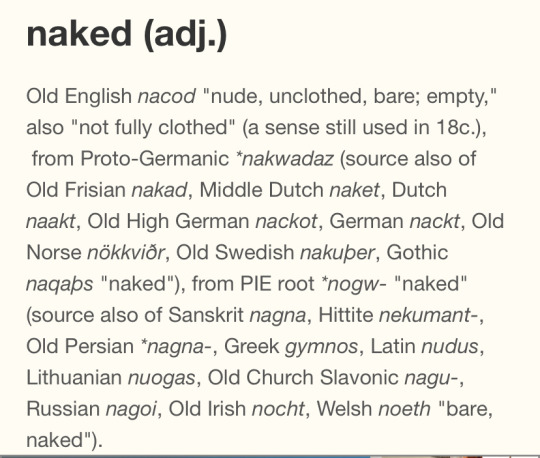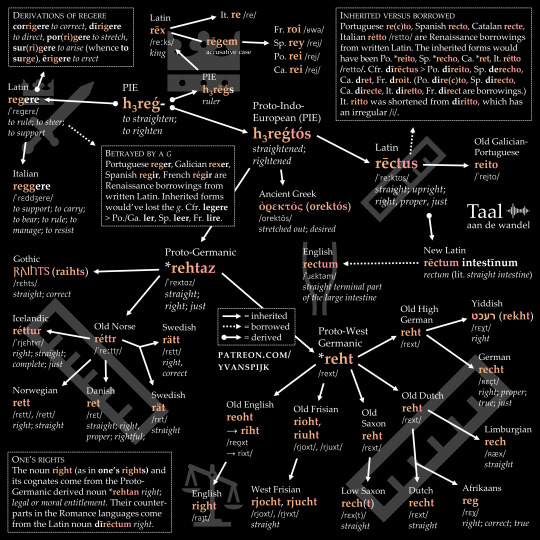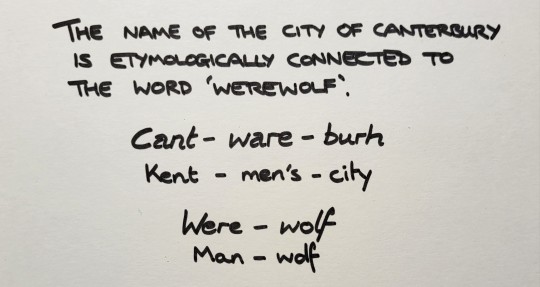#etymology
Text
#namjoon smut#etymology#Corbin Fisher#good omens 2#new horizons#colonialism#teddy moutinho#komahina#ronda rousey#kustom kulture#mycology#streetstyle#transformers prime#polina aura#troyler
133 notes
·
View notes
Text
holy sh...
"My dear fellow."*

Aziraphale made up a surname for himself off of a sweet thing he calls Crowley. The original "Mr. Fell", of sorts, is the angel's dear fellow.

Makes it even funnier that Aziraphale had Gabriel calling him "Mr. Fell" in S2 😂

*Also, the amusing "dear"/"deer" homophony and "fellow" being made up of "fell-ow!"... and about seven other wordplay things... but that will have to be a later post as my brain is now just a mush of my dear fellow...
#ineffable husbands#aziracrow#good omens#good omens 2#good omens meta#crowley#aziraphale#ineffable husbands speak#etymology
52 notes
·
View notes
Text

I was wondering if the word naked was derived from some obsolete verb, since there’s not a lot of English adjectives that end in -ed, but nope—it’s one of the few words we’ve got that goes all the way back to Proto-Indo-European without changing meaning
41 notes
·
View notes
Text

The words right and rectum have a common origin. Right comes from Proto-Germanic *rehtaz ('straight; right; just'). This word shared a common Proto-Indo-European ancestor with Latin rēctus ('straight; right; just'), from which the medical term rectum ('straight terminal part of the large intestine') was derived. The infographic shows more.
#historical linguistics#linguistics#language#etymology#english#dutch#german#low saxon#frisian#old frisian#old saxon#old high german#old english#old dutch#lingblr#proto-germanic#proto-west germanic#yiddish#limburgian#faroese#icelandic#norwegian#swedish#danish#latin#french#spanish#old spanish#old french#old galician-portuguese
41 notes
·
View notes
Text

85K notes
·
View notes
Text
Fact: The earliest reliably dated use of the phrase “fucked up” appears in the court records of a US Navy court-martial case from 1863; the way the phrase is used suggests that its meaning was already well known at the time, but this is the first known printed record of it that we can confidently put a date to.
Additional fact: Bram Stoker’s Dracula is set in 1897.
Conclusion: It would not anachronistic for your Dracula fanfic to have a character describe the Count as a fucked up old man.
#media#literature#dracula#bram stoker's dracula#fandom#fanfic#history#language#linguistics#etymology#swearing#sherlock holmes could also say 'fucked up'#he wouldn't#but he could
58K notes
·
View notes
Text
little poll
13K notes
·
View notes
Text
okay so I was doing a Research™️ about ancient Greek etymology as one does and I found some Things that made me want to Violently Claw My Arms Off please allow me to force feed you my discoveries
So there are 2 words for "not" in ancient Greek, depending on the context: ou and mē. Having introduced himself in the Cyclops episode as " ou tis", or No-man, he then stabs Polyphemus in the eye. When Polyphemus' brothers come to check on him, they say this:
"... surely no man [mē tis] is carrying off your sheep? Surely no man [mē tis] is trying to kill you either by fraud or by force?"
Right after this, after the other cyclopes ditch Polyphemus, Odysseus's inner monologue goes something like this:
"Then they went away, and I laughed inwardly at the success of my clever strategem [metis]." (pronounced mEH-Tis)
Now, there's a difference between mē tis and metis. [mē tis] (pronounced mEH-Tis with a space between the syllables) is the literal translation for "no man". Metis is a word for extreme intelligence/cunning, which is something Odysseus is famous for.
Now, there are several examples of abuse of metis/intelligence in the Odyssey, but I think the juxtaposition between [mē tis], or the concept of anonymity, and metis, or extreme intelligence, is REALLY interesting. Odysseus's adoption of the title "No-man" was characteristic of metis--it was a really smart move that simultaneously hid him from the cyclops and avoided any future consequences. It was a highly effective strategy all wrapped up in a nest little package with a bow on it.
But when he revealed himself as Odysseus of Ithaca, effectively throwing off No-man (anonymity and [mē tis]), that was characterized as idiocy--he's essentially doxxed himself, and now he's doing to (spoiler alert) get tossed around the Mediterranean by Poseidon for the next 10 years.
This is really interesting because it lets you see the parallels/codependency between metis(intelligence) and humility. When Odysseus refused to allow himself to go unnoticed (hubris) he suffered for it. BUT when he declined instant glory/satisfaction (kleos) in order to achieve the long term goal of survival, he was rewarded with Athena's favor (pay attention. This part is important).
And this situation repeats itself MULTIPLE TIMES in the Odyssey--the EXACT SAME THING happens near the end of the book, with the suitors. When. Odysseus is dressed as a beggar and the suitors/Antinious are abusing him, he ACTIVELY CHOOSES not to react--he doesn't stand up and rip off his disguise and start hollering "TIS I, ODYSSEUS OF ITHACA! FEAR MY WRATH"
No. He sits there patiently and waits. He plans and schemes and quietly orchestrates their downfall without alerting them of it. Why? Because he learned his lesson the first time this happened. He buried his rage and adopted what was, according to Grace LA Franz, a more feminine form of metis, weaving a web of destruction for his enemies that ultimately resulted in their total annihilation (see Weaving a Way to Nostos: Odysseus and Feminine Metis in the Odyssey by Grace LaFranz). His patience allowed him to win the whole prize--no questions asked, no 10-year-long-business-trip strings attached--just the sweetness of a full victory. And he is, once again, rewarded with Athena's favor--both in the battle with the suitors and in the aftermath (cleanup/reuniting with Penelope).
This really reinforces the idea in the Odyssey that Odysseus's defining characteristic is not just his intelligence--it's his ability to learn from his mistakes. He used what he learned at the Lotus Eaters Island against Polyphemus--the Lotus Eaters drugged his men, so he drugged Polyphemus. He used what he learned from Circe and Polyphemus against the suitors--Circe used false sweetness and honeyed words to lure his men into a trap, so that's exactly what he did to the suitors. His hubris on Polyphemus' island cost his whole crew their lives, so he intentionally left well enough alone until the right time. He didn't just learn from his failures--he turned them into BATTLE STRATEGY.
i don't care what anyone says that is completely totally and objectively awesome
#Odysseus is a certified baddie 112% of the time#he's literally the coolest you can't convince me otherwise#there's a reason that literally everyone has a crush on him#even the lesbians#its the wordplay. his words#read me a poem in iambic pentameter you bloody stinky man#literally everyone: his sad wet vibes and dark undereye circles have captivated me entirely#odysseus#the odyssey#tagamemnon#odysseus x penelope#telemachus#epic the musical#the cyclops saga#odysseus of ithaca#poseidon#etymology#ancient greece#ancient history
2K notes
·
View notes
Text
A Magical Taxonomy
Warlock: from wær (old English, “pact/oath”) + loga (proto-Germanic, “liar”) + hard “-ck” (Scottish English); Oathbreaker (contextually; breaker of Baptismal Oaths; hence also Apostate)
Wizard: from Wis (old English, “knowledgeable”) + -ard (same, “too much of”); Possessor of too much knowledge
Witch: from weyk (proto-indo-European, “apart, separated, different”)[connotations akin to Latin’s “Sacre”]; Sacred Outsider
Sorcerer: from Sors (Latin, “Fate”) and Ser (same,“to bind”); Fate Manipulator
Druid: from dru (proto-Celtic, “Oak”) + weyd (same, “to see”); Oak-Seer, or Tree-Knower
Cleric: from kleros (Ancient Greek, “lots/ casting lots/ drawing lots”) [contextually; public servants were selected by drawing lots, as opposed to, say, voting]; Public Servant / Clerk
Bard: from bard (proto-Celtic, “Bard”); Bard
#Magic#etymology#dnd#history of the occult#occult#witch#Wizard#sorcerer#warlock#cleric#bard#bard bard#bard bard bard#bard bard bard bard#it’s bards all the way down
5K notes
·
View notes
Text
Transcendentalism is a hard word to grasp, so it's important to look at the etymology of it so you can parse its meaning.
Trans - to be beyond or across
Cen - one hundred
Dental - Teeth
Ism - the belief of
So taken all together, transcendentalism means "the belief that one should have beyond one hundred teeth"
Hope this helps!
#thank you to one of my classmates for making this joke in english a little while back#transcendentalism#transcendental#funny#etymology
1K notes
·
View notes
Text

she gets me she just does
#kassandra#cassandra of troy#kassandra of troy#greek mythology#anne carson#greek women#tagamemnon#speaking of#fuck agamemnon#apollo#etymology#cannot believe i forgot that tag
684 notes
·
View notes
Text
"Terrible"
"You really are (wordplay emphasis pause)... terrible at magic."-- Crowley in 1941.
Terrible. Contains the words: Ter, Rib, and Ble.
Ter: Means three, or thrice over. Job & Sitis' three kids. Rib: Ox ribs.

Ble: French for wheat. Wheat is botanically a fruit and one of the foods speculated on by humans to be what Eve ate. To reference it is to continue to liken them to Adam and Eve and joke about "sin"/temptation and Aziraphale eating the ox ribs.
To 'rib' someone: Lovely American expression meaning to good-naturedly tease a person.

"You really are terrible at magic." = Actually, the opposite of that.


#ineffable husbands#aziracrow#good omens#crowley#aziraphale#good omens meta#good omens 2#ineffable husbands speak#etymology
28 notes
·
View notes
Photo

You might have thought card sharks and loan sharks were named after the predatory fish, but apparently there’s a decent chance it’s the other way around from an old Dutch word meaning “person that takes unfair advantage of other people”. Before that they were known in English as a haye or dogfish, which means sometime in the ~1400s enough English sailors started saying “don’t get in the water, it’s infested with those jerks”
27K notes
·
View notes
Text
did you know? the word "footage" in reference to video originally referred to the length of the physical film strip that something was recorded on. a longer recording would use up more feet of film, and thus would have "more footage"! cool, huh?
THIS POST IS ABOUT ACTUAL ETYMOLOGY. DO NOT ADD MORE EXAMPLES OF THE ORIGINS OF WORDS WITHOUT FACT CHECKING FIRST.
857 notes
·
View notes
Text
I love love love etymology because it's like every word has a back story intertwined with so many other words and through that you see ideas and culture and history and people and it's so beautiful okay I love word stories
15K notes
·
View notes

